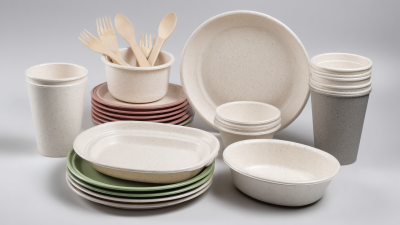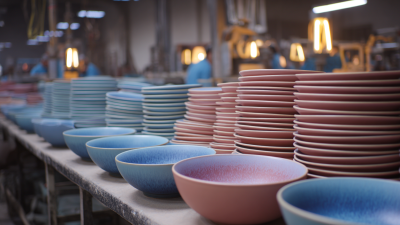As the global shift towards sustainability accelerates, the dining industry is increasingly embracing innovative solutions to reduce environmental impact. Among these solutions, Plant-Based Tableware has emerged as a prominent alternative, spurred by a growing awareness of plastic pollution and a commitment to eco-friendly practices.

According to a report by Allied Market Research, the market for biodegradable products, including plant-based tableware, is expected to reach $16.5 billion by 2027, growing at a CAGR of 12.2%. This surge reflects not only the rising demand from environmentally conscious consumers but also the proactive measures taken by restaurants and foodservice providers to enhance their sustainability profiles.
As businesses seek to adapt to changing regulations and consumer preferences, the future of Plant-Based Tableware appears promising, carving out a niche in the realm of sustainable dining solutions and setting a new standard for environmentally responsible practices.
The future of plant-based tableware in sustainable dining solutions is set to transform the culinary landscape significantly. As awareness of environmental issues grows, consumers are increasingly seeking eco-friendly alternatives to traditional disposable products. This shift is evident in the rising popularity of tableware derived from renewable resources such as bamboo, sugarcane, and cornstarch. These materials not only reduce waste but also minimize the carbon footprint associated with production and disposal.
Innovations in plant-based tableware are also paving the way for enhanced functionality and design aesthetics. Manufacturers are experimenting with composite materials and advanced manufacturing techniques to create durable, stylish options that appeal to a broader audience. As the trend gains momentum, businesses in the hospitality and foodservice sectors are embracing these solutions, offering customers attractive and sustainable dining experiences.
This fusion of sustainability and style will likely influence consumer preferences, creating a domino effect that further drives the demand for plant-based alternatives in the future.
When considering sustainable dining solutions, the choice of tableware plays a pivotal role. Plant-based tableware, often made from materials like sugarcane, cornstarch, or bamboo, presents an eco-friendly alternative to traditional options such as plastic and Styrofoam. Unlike their conventional counterparts, plant-based products are biodegradable and compostable, breaking down naturally without contributing to landfill waste. This shift not only reduces environmental impact but also aligns with a growing consumer demand for sustainability.

Comparatively, traditional tableware options like plastic and Styrofoam are associated with significant environmental drawbacks, including long decomposition times and pollution. While these materials may be advantageous in terms of durability and cost-effectiveness, their single-use nature contributes vastly to the global waste crisis. In contrast, plant-based tableware combines functionality with environmental responsibility, offering similar strength and versatility while serving as a champion for sustainable practices.
As restaurants and consumers increasingly prioritize eco-friendliness, the future of plant-based tableware seems promising, paving the way for a more sustainable dining experience.
The environmental impact of traditional dining options is becoming increasingly clear, prompting a shift towards plant-based tableware as a sustainable solution. Conventional materials like plastic and styrofoam contribute significantly to landfills and ocean pollution, posing profound threats to wildlife and ecosystems. In contrast, plant-based tableware, often made from materials like bamboo, sugarcane, or wheat straw, not only reduces waste but also composts effectively, offering a circular solution that nature can easily assimilate.
When considering a switch to plant-based tableware, it's essential to explore local suppliers that prioritize sustainability in their production processes. Look for certifications, such as compostability or biodegradable labels, which indicate that the products will break down safely. Additionally, embracing reusable plant-based options can amplify eco-friendly efforts; many companies now produce durable, washable alternatives that can be used multiple times, further reducing environmental footprints.
Lastly, educate others about the benefits of plant-based options. Organize community events or discussions to share insights on how these choices can combat conventional dining’s adverse effects. By collectively advocating for sustainable practices, we can foster a culture of environmental consciousness, enabling a brighter future for dining experiences.

The increasing demand for sustainable dining solutions has led many restaurants to explore the cost-effectiveness of plant-based tableware. According to a 2021 report from the Foodservice Packaging Institute, the global market for sustainable tableware is expected to grow by 10% annually, driven by both consumer preferences and regulatory pressures on single-use plastics. However, the affordability of plant-based options remains a crucial factor for restaurants looking to transition away from traditional materials.
A recent analysis indicated that while plant-based tableware can come at a higher initial cost—ranging from 15% to 25% more than conventional plastic or styrofoam—many establishments can offset these expenses through bulk purchasing and partnerships with suppliers. Additionally, a survey by the National Restaurant Association showed that 63% of consumers are willing to pay a premium for eco-friendly dining experiences, highlighting the potential for increased customer loyalty and revenue. By investing in plant-based tableware, restaurants not only contribute to environmental sustainability but also align their businesses with the growing preferences of eco-conscious consumers.
As consumer consciousness shifts towards sustainability, the demand for plant-based tableware is rapidly increasing. According to a recent market report from Grand View Research, the global biodegradable tableware market is projected to reach $5 billion by 2025, growing at a compound annual growth rate (CAGR) of over 8%. This growth is largely driven by an increasing number of consumers prioritizing eco-friendly solutions for their dining experiences. Studies indicate that nearly 60% of millennials actively seek out sustainable dining options, indicating a notable shift in consumer preferences.
To appeal to these changing attitudes, businesses should consider integrating plant-based tableware into their dining solutions. Offering products made from materials like sugarcane, bamboo, or cornstarch not only aligns with consumer values but can also set a brand apart in a competitive market. Implementing an easy-to-understand recycling or composting guide can encourage customers to engage with sustainable practices effectively.
Tip: Highlight your use of plant-based materials in marketing materials to attract eco-conscious consumers. An informative label on each product can educate customers about the environmental benefits of their choices.
Tip: Hosting events that showcase the use of sustainable tableware can enhance customer experiences and reinforce commitment to sustainability while fostering brand loyalty.






